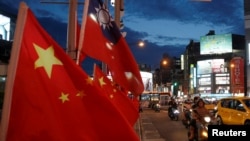Relations between old rivals China and Taiwan have been shaken again over a foreign extradition case and Beijing’s re-interpretation of a Taiwanese political holiday, stalling any prospects for dialogue or cooperation.
China drew protest from Taiwan President Tsai Ing-wen’s government last week when it found that Spain would send about 200 Taiwanese nationals to China on suspicion of telephone fraud. Spanish and Chinese authorities found in December the suspects had used Spain as a base to defraud mainland Chinese victims.
In a separate case, China challenged the motives behind an annual Taiwan holiday that marks the start of a deadly period of history 70 years ago.
New issues such as the fraud case and holiday flap will delay any chances, already remote, of better relations between communist China and the Taiwan government of President Tsai's Democratic Progressive Party (DPP), analysts say.
"It would only add up to finally make the bulk of the DPP members or leaders realize their current approach would not lead to anywhere," said Lin Chong-pin, retired strategic studies professor from Tamkang University in Taiwan. "It takes a lot of time to add up to that."
China has seen Taiwan as part of its territory since the Chinese civil war of the 1940s, though each is self-ruled.
Conditions for talks
After eight years of upbeat relations, the two sides quit talking in May when Tsai took office. She disputes Beijing’s dialogue precondition that both sides regard themselves as part of China. Neither side has come up with new conditions acceptable to the other.
China relaxed briefly toward Taiwan earlier this month after U.S. President Donald Trump told his Chinese counterpart, Xi Jinping, he would respect Beijing’s policy defining Taiwan as part of China - and the Taiwan government said it understood why Trump made his decision.
Trump had talked in December by phone with the Taiwan president. The surprise move raised fear in Beijing that Taiwan’s strength would grow on improved ties with the United States.
But when Taiwan found that Spain would send 218 fraud suspects to China for prosecution despite their Taiwanese passports, it complained to Spain as well as Beijing. The Taiwan government’s Mainland Affairs Council protested the "unilateral" decision by Beijing, saying it would hamper any trust or cooperation.
Other countries, such as Kenya and Malaysia, have turned over groups of Taiwanese suspects to China since April 2016. This case particularly angered Taiwan because it netted a relatively large group of deportees and involved the first from Europe, said Alexander Huang, strategic studies professor with Tamkang University in Taiwan.
Taiwan holiday
Also last week, the government in Beijing took issue with the motive behind Taiwan's 228 Peace Memorial Day, an annual public holiday of more than 20 years.
On Feb. 28, 1947, a dispute between a cigarette vendor and an inspector in Taipei touched off an anti-government rebellion. Chiang Kai-shek, the Nationalist Party leader in charge then, violently repressed the uprising for years, killing tens of thousands.
The Nationalists had rebased in Taiwan after losing mainland China to the communists in the 1940s. Their authoritarian rule over the island lasted until democratization four decades later. People who remember 1947 want Taiwan’s government to reveal more about what happened and name Chiang as a key figure.
“They have to get through to the top,” said Shane Lee, political scientist at Chang Jung Christian University in Taiwan. “This year they’re trying to get to Chiang Kai-shek. In the past they only got to the generals under Chiang Kai-shek. He was the one that was really responsible.”
China accused “secessionist forces” in Taiwan of distorting the Feb. 28 incident “to stoke conflict and split public opinion on the island,” Beijing’s official Xinhua News Agency said, quoting a spokesperson with the Chinese government’s Taiwan Affairs Office. A symposium on the event was due to take place in China Feb. 23.
The term “secessionist forces” is likely a reference to Taiwanese who advocate for the island’s legal independence from China. Some members of Tsai's party share that view, but Taiwan’s constitution still binds the two, dating back to when Chiang ruled all of China and later hoped to retake the mainland after defeat in the country’s civil war.
Beijing, backed by the world’s third most powerful military, has called any moves toward independence a red line for relations. It hopes eventually to reunify the two sides.
The Taiwan government’s Mainland Affairs Council on Thursday asked China to be fair, “understand the essence of this event correctly” and share Taiwan’s experience in remembering it.
Although some analysts believe China and Taiwan are quietly looking for a way to restart dialogue, others expect more disagreements like the ones this month.
Expect more “bullying” from China over the “uncertainty” it perceives since Trump took office, said Coen Blaauw, executive director of the Washington-based advocacy group Formosan Association for Public Affairs.
“Even though Taiwan has signaled clearly it does not want or plan to rock the boat in its relationship with China, it seems as if China is doing the exact opposite and is taking the gloves off,” Blaauw said.












